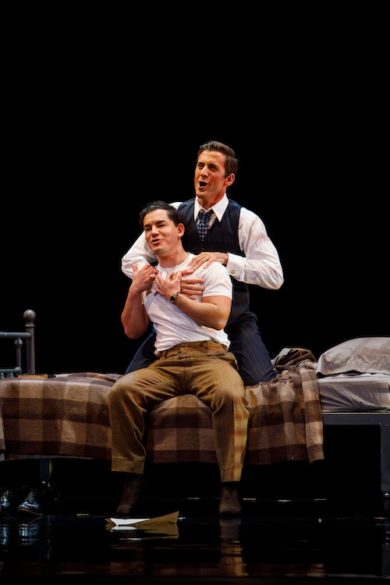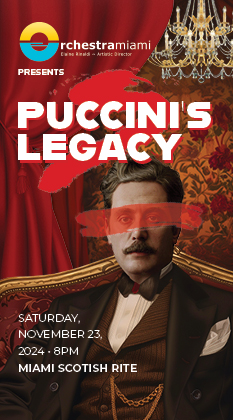FGO’s compelling “Fellow Travelers” illuminates dark days of McCarthy era

Andres Acosta (front) and Hadleigh Adams in Gregory Spears’ Fellow Travelers at Florida Grand Opera. Photo: Jorge Parra
Gregory Spears’ opera Fellow Travelers recalls one of the darkest eras of 20th-century American history. The witch-hunts of Senator Joseph McCarthy during the 1950’s encompassed both the Red and Lavender scares. In the latter, hundreds of gay State Department and government employees were hounded, persecuted and removed from their jobs as alleged “deviants” and security risks.
That is the historic backdrop for Spears’ work. Florida Grand Opera’s superb staging at the Lauderhill Performing Arts Center on Saturday night made for a compelling two hour musico-dramatic essay that pulsated with joy and sadness. The first-night audience awarded the cast and composer a prolonged standing ovation.
Based on a novel by Thomas Mallon, the tale tells of a forbidden relationship between State Department official Hawkins Fuller and former journalist Timothy Laughlin who works for Senator Potter (an ally of McCarthy). Fuller is a reckless bon vivant while Laughlin is devoutly Catholic and politically conservative. Their accidental meeting results in the two men becoming close and intimate. In the climate of fear while wishing to move on to his next conquest, Fuller eventually betrays his partner, reporting him to the FBI and ruining his ambitions for public service. Yet, instead of hating him as Fuller hopes, Laughlin is forgiving as he bids his onetime companion a farewell.
From the atmospheric opening bars, Spears paints this saga of love, political oppression and betrayal in elegantly crafted strokes. Minimalist figures calibrated with harmonic depth become expansive and lyrical in key emotional moments. Instrumental interludes between the sixteen scenes ring forth with an almost neo-Baroque sensibility. The ensemble in the Christmas party scene is masterfully constructed and arias and set pieces take potent wing while keeping the protagonists’ conflicted yearnings front and center. Ultimately Spears’ score resounds with potent drama and humanity, the final scene deeply moving.
Greg Pierce’s compact libretto avoids didactic ideological speeches while framing the characters’ desires, traumas and actions sympathetically. Pierce even manages to inject humor into the swirling political backdrop, the one-liners about McCarthy and his henchman counsel Roy Cohn drawing laughter from the first night audience.
FGO has given this saga a fast-paced, riveting production. Peter Rothstein’s fluid direction moves with the suspense and directness of gripping cinema. An intimate bedroom scene between the two lovers that could have been gratuitous is staged so tastefully that it seems a natural progression in their relationship. Columns dominate the stage in designer Sara Brown’s unit set from Minnesota Opera but Mary Shabatura’s lighting makes them look different for each scene, capturing the varied locales effectively. Trevor Brown’s dizzying array of period costumes match the drama’s milieu and undercurrents.
This opera depends heavily on the performances of the two male leads and Hadleigh Adams and Andres Acosta meet the vocal and dramatic demands triumphantly. Adams stepped in on short notice as Stanley Kowalski in FGO’s January production of Andre Previn’s A Streetcar Named Desire and it was astonishing how different his characterization was as Fuller. As Kowalski, Adams’ baritone boomed and he projected a larger-than-life stage persona. Almost like a method actor, he beamed Fuller’s cosmopolitan sophistication and snobbishness. Adams sang with subtlety, his clear diction inflecting the text with insinuating irony. In the aria “Our very own home,” his dark sound caressed and wove the long vocal lines as Hawkins resolves to end the relationship. Both Fuller’s tenderness and fickle heartlessness were encompassed in Adams’ portrayal.
Acosta was no less remarkable, his vibrant light tenor and scene stealing presence capturing Laughlin’s dilemma between his feelings of love and abiding faith. He made “How many kisses” into a compelling psychodrama as he confessed his sin after a night with Fuller but thanked God for bringing them together. In duo Acosta and Adams’ voices blended vociferously and their scenes together were marked by expressive volatility and sexual tension.
The other clear star of the uniformly excellent cast was Adelaide Boedecker as Mary Johnson, a colleague of Fuller at the State Department office and friend of Laughlin. Her soprano soared in the aria “I worry, that’s all,” a lyrical outpouring worthy of Carlisle Floyd. Boedecker’s spectacular high register rode the big ensemble number in the party episode and, when Mary realizes Fuller’s treachery, her rage and compassion for Laughlin turned tragic and powerful. This young singer is an artist with tremendous potential and one looks forward to her future performances.
Amanda Olea brought a bright soprano timbre and gossipy personality to Miss Lightfoot who reports Fuller to the FBI. In the absurd interrogation scene (in which Fuller’s walk is studied as evidence of possible deviance), Erik Danielson’s low bass register and haughty bearing commanded attention as the interrogating agent and he did double duty as a starchy Senator Potter.
Charles Calotta’s rapid-fire declamation personified the scheming Timothy McIntyre who is blackmailing the saintly Potter over his illegitimate child. Michael Pandolfo hectored appropriately as McCarthy but offered a softer baritonal side as Estonian Frank (who has a one-night fling with Mary, making her pregnant). Page Michels made the most out of the limited opportunities afforded Lucy, the office worker Fuller marries out of convenience. Christopher Humbert, Jr. impressed with firm low tones as Potter’s assistant and a French priest who ministers to Laughlin.
Emily Senturia conducted a taut, flowing reading of the score, making the 17-piece orchestra sound considerably fuller and richer beyond its numbers. She was especially effective at capturing the transparency and John Adams-like verve of Spears’ wind writing. Her balancing kept the voices forward while ensuring that orchestral detail remained clear and audible.
The Lauderhill hall is a fine venue with plenty of free parking—unlike downtown Miami or Miami Beach. Sight lines are clear and unimpeded and the acoustic flatters voices, bringing clarity to the English text.
Spears’ opera is an engaging, relevant addition to the 21st-century musical theater repertoire. Music lovers who care about the future of the art form should not miss one of the three remaining performances of this outstanding production.
Florida Grand Opera repeats Fellow Travelers 2 p.m. Sunday and 7:30 p.m. Tuesday and Thursday at the Lauderhill Performing Arts Center, 3800 NW 11th Place in Lauderhill. fgo.org
Posted in Performances
Leave a Comment
Sun Apr 24, 2022
at 12:21 pm
No Comments


